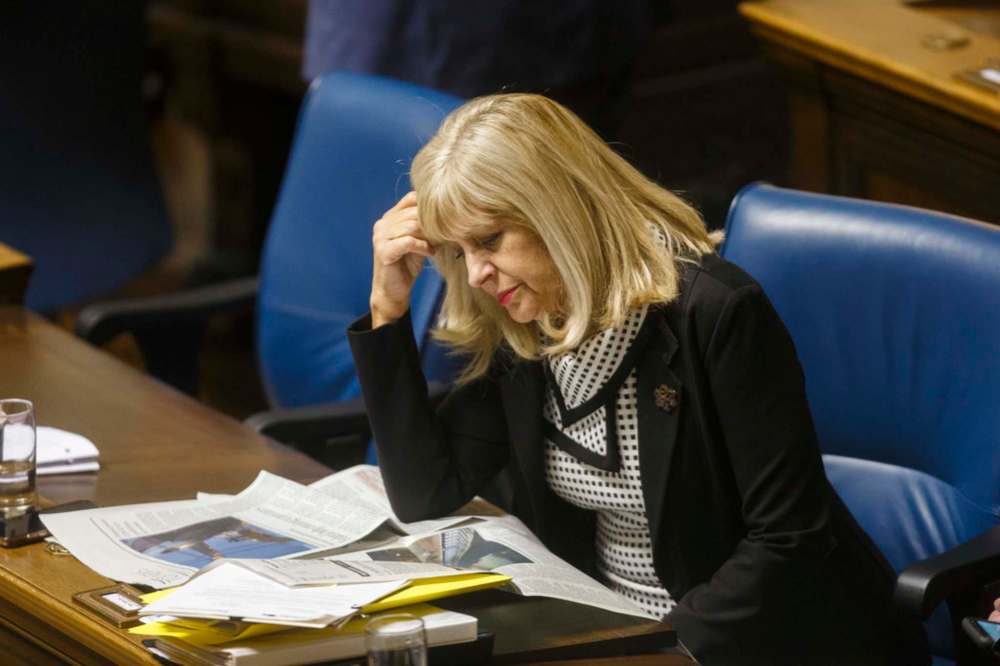Province readies for potential rise in domestic violence
Advertisement
Read this article for free:
or
Already have an account? Log in here »
To continue reading, please subscribe:
Monthly Digital Subscription
$0 for the first 4 weeks*
- Enjoy unlimited reading on winnipegfreepress.com
- Read the E-Edition, our digital replica newspaper
- Access News Break, our award-winning app
- Play interactive puzzles
*No charge for 4 weeks then price increases to the regular rate of $19.00 plus GST every four weeks. Offer available to new and qualified returning subscribers only. Cancel any time.
Monthly Digital Subscription
$4.75/week*
- Enjoy unlimited reading on winnipegfreepress.com
- Read the E-Edition, our digital replica newspaper
- Access News Break, our award-winning app
- Play interactive puzzles
*Billed as $19 plus GST every four weeks. Cancel any time.
To continue reading, please subscribe:
Add Free Press access to your Brandon Sun subscription for only an additional
$1 for the first 4 weeks*
*Your next subscription payment will increase by $1.00 and you will be charged $16.99 plus GST for four weeks. After four weeks, your payment will increase to $23.99 plus GST every four weeks.
Read unlimited articles for free today:
or
Already have an account? Log in here »
Hey there, time traveller!
This article was published 29/04/2020 (2019 days ago), so information in it may no longer be current.
At a time when health-care workers, grocery store clerks, cleaners and social services staff are on the front lines of a pandemic, governments are being called upon to consider the particular burden women are shouldering in the global emergency.
In Manitoba, provincial officials are preparing for a potential escalation in domestic violence and have plans in place to increase the capacity of women’s shelters, said Cathy Cox, minister responsible for the status of women. Asked whether the particular needs of women in Manitoba are taken into consideration as part of its emergency response planning, Cox didn’t directly answer.
“COVID-19 has affected all of us, universally… not only financially but socially. As a mom and a grandmother… I look towards the future each and every day, and I want to make sure that everything we’re doing benefits all Manitobans and essentially all women and children here,” she said in an interview.

“So what we’re doing is working broadly to ensure that women, children are safe during this time, that they have the ability to return to work as necessary, and also provide them the opportunity to stay home where that’s necessary.”
Around the world, women represent 70 per cent of the health and social sector workforce, according to a report released in March by the United Nations Population Fund. The UN urged governments to pay attention to the specific needs of female medical professionals, as well as other essential workers and caregivers, provide support for domestic violence victims, and involve women’s groups in the decision-making process for COVID-19 response plans.
Shortly after the Canadian government announced funding for women’s shelters meant to support those fleeing violence during the pandemic, women’s groups across the country signed a joint letter to Maryam Monsef, the federal minister for women and gender equality.
They asked for, among other things, emergency funding for women’s organizations and data collection that can shed light on how COVID-19 is affecting Canadian women.
Cox said she spoke to Monsef after the pandemic was declared to discuss support for domestic violence shelters. It has been her focus, she told the Free Press.
“We want to ensure that women are safe, and we know that there could be a spike or an escalation in women needing additional spaces, not only here in Winnipeg but also throughout the province. So I can tell you that those plans are in place in case we do need to ensure that there’s additional capacity as required,” said Cox, declining to provide specific details.
She said the province is looking to permanently establish crisis lines women can access via text message — a service two Manitoba shelters have already set up because of COVID-19 physical-distancing requirements — and implement a provincewide information-sharing system on which shelters have available space.
At Willow Place, a Winnipeg family violence agency, crisis phone calls have increased and the shelter is operating at or near-capacity — even though it is using only half the number of beds to make sure clients keep their distance from each other, said executive director Marcie Wood.
“During this time, it is difficult, and we do expect, and we do know, that domestic violence will escalate… And sometimes it’s not as visible as we might think it is, and that is just something that I think people should be mindful of, and to seek help if they need to, and that there is ways to do that that are discreet should the need arise,” Wood said.
Even beyond family violence, there has long been a general reluctance to make decisions based on a gender analysis or consider how plans affect women before putting them in place, said Arlene Draffin Jones, past-president of the Provincial Council of Women of Manitoba.
“I don’t pretend that we think we know all the answers, because I think we’re all struggling for that. But right now, I think our role is to remind people that the people that are keeping us going right now are indeed majority women, and they’re carrying, often, double and triple loads,” she said. “So maybe we need to keep reminding our governments, provincial and federal, that this is something we need to really address.
“And it will go on — it won’t end after all this.”
katie.may@freepress.mb.ca
Twitter: @thatkatiemay

Katie May is a multimedia producer for the Free Press.
Our newsroom depends on a growing audience of readers to power our journalism. If you are not a paid reader, please consider becoming a subscriber.
Our newsroom depends on its audience of readers to power our journalism. Thank you for your support.

